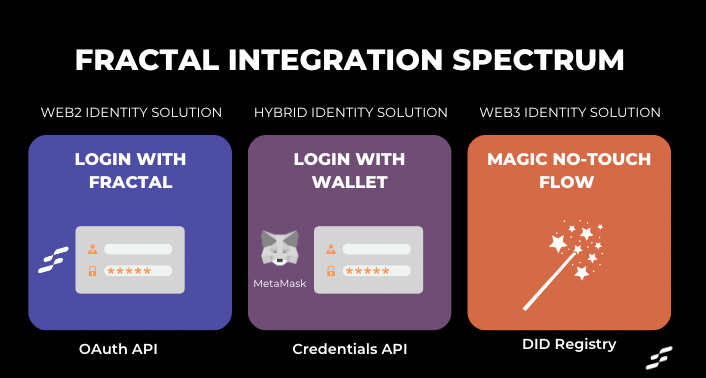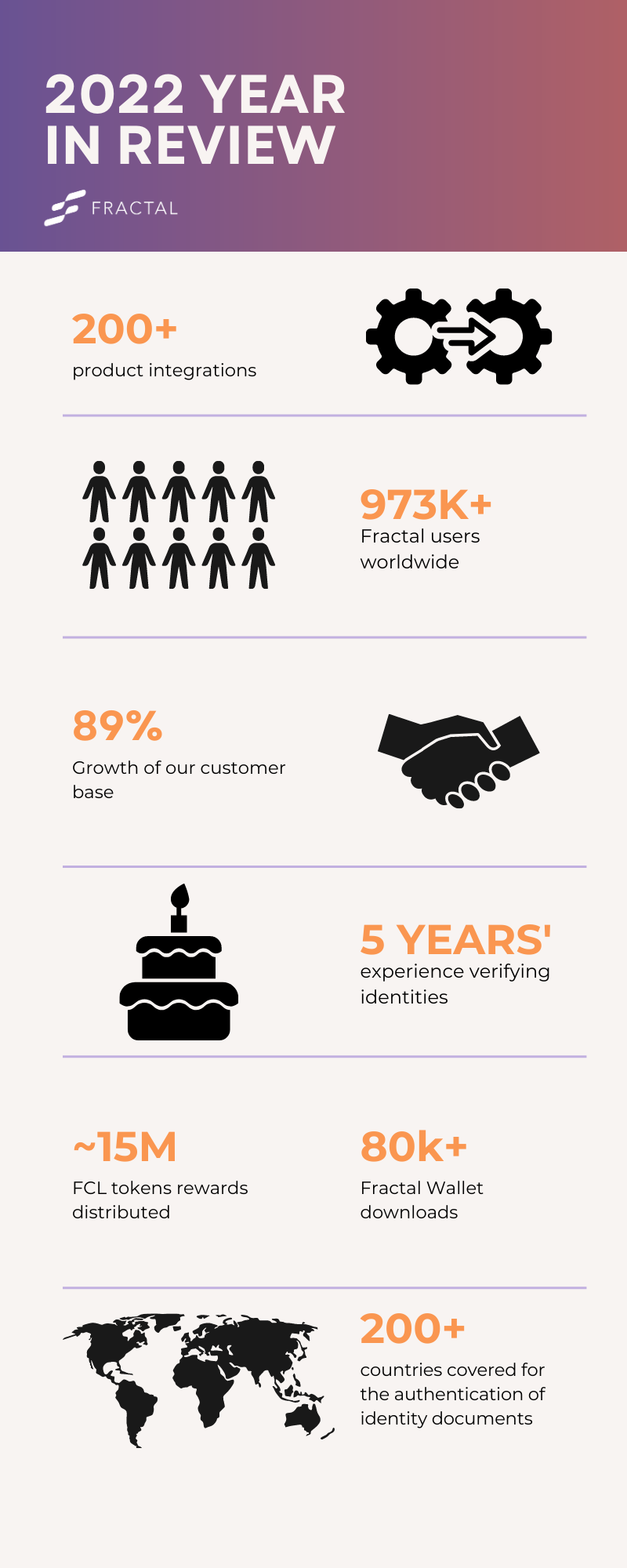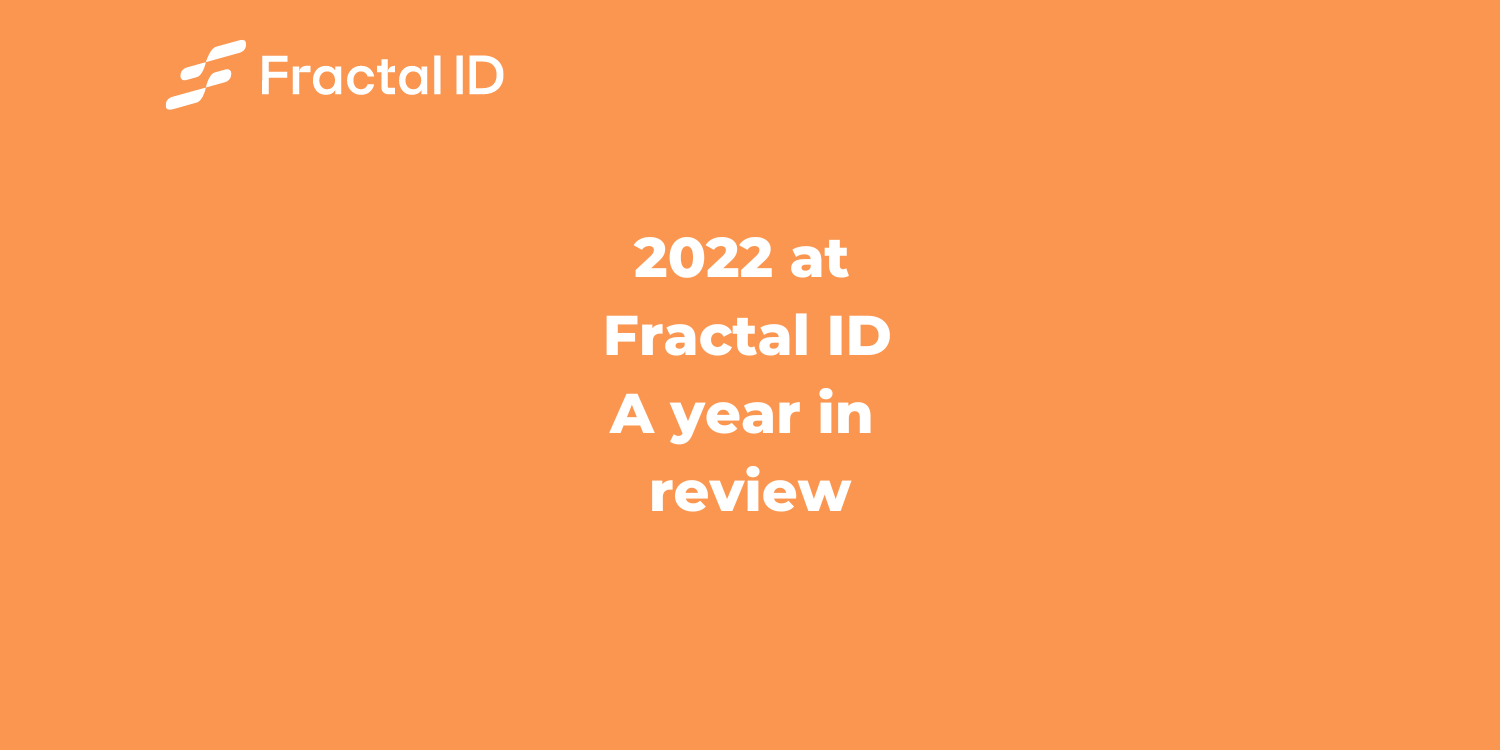Going back to our roots. Empowering a human-centered web3 space
Key Points
2022 was an eventful year for Fractal ID!
We are proud to say that we have set the cornerstone to realize Fractal ID’s initial vision of creating a better web3 for everybody. To do that, we took a step back to focus on establishing grounds for decentralized identity solutions that progress both businesses’ and users’ experiences.
With these solutions, we were able to grow our user base to reach ~973k users, and empower like-minded businesses and ecosystems to grow their own user base, provide them with seamless experiences, and maintain their compliance with data privacy regulations without risking their reputations.
Here are our 2022 successes:
- We went multi-chain and are now natively on Polygon, Avalanche, Gnosis with more to come soon
- User growth grew to 973k users with a Fractal ID which more than half are verified (proof-of-personhood or KYC) making us the largest DID provider in web3 from what we can see
“Sometimes when it feels like we are moving backwards, we are setting ourselves up for a big jump. I believe that this jump is ahead for decentralized identity in 2023. We needed to feel again why we are building decentralized systems in the first place. We needed to be reminded that basic decentralized infrastructure must be in place to move forward. We are ready now.”
Julian Leitloff, Co-founder and CEO
1. Going back to our roots: Why doubling down on identity is enabling us to realize our initial vision
2022 has been the year of change for Fractal ID. We delivered on the initial idea of building a better advertisement ecosystem by delivering the Fractal ID Wallet.
The world is not ready yet for AdTech alternatives, but we are on the way
Over 80k users downloaded the Fractal ID Wallet to collect browsing data to store it locally — which made it one of the most successful cases for data unions. A great start for a web3 use case, but only a tiny drop in the ocean for internet users. However, we realized a dilemma that we couldn’t overcome: As the internet didn’t become successful by brick-and-mortar businesses pushing it forward, neither would web3 become successful by Web2 pushing it forward. The ad industry is broken and most players realize it. But adopting web3 technologies means major changes to its business models. A step that most players are years away from taking.
In the early summer of 2022 we realized that with no existing web3 ad tech ecosystem in place we need to go back to the root of what Fractal ID is: building the backbone of identity provisioning for web3. Without an identity to ascribe data to, we are lacking the fundamental infrastructure for users to truly own their data and build new ways for data to be shared.
“After years of shouting into the void, in 2022 web3 finally got how critically decentralized identity is needed. We’ll keep building during the bear as we have before, so that when the next bull brings the next billion users, they can have in web3 the respect the previous webs refused them.”
Julio Santos, Co-founder and CTO
Why identity is the future of web3
However, our efforts have not been in vain. Fractal ID has built a functioning wallet for verifiable credential provisioning. Fractal ID saw a massive surge in users from roughly half a million users in the beginning of the year to now nearly one million users. We realized that building a monolithic entrenched solution isn’t going to work either: The future of web3 is multi-chain and interoperable. We need to be where the users are and so are our identity registries.
Identity is messy and we embrace the mess. We don’t care about perfection if that means having great standards that no one is using. In lack of transparency in the market, we can only assume that Fractal ID today is the market leader when it comes to identity provisioning in web3. Today we serve over 320 clients on all major ecosystems. You will find Fractal ID empowering some of the major identity efforts underway in web3.
2. Partnerships
Even during the bear market in 2022, we managed to grow our customer base by ±89%, reaching across all types of DeFi, gaming, and metaverse dApps and ecosystems.
Main players in the industry we partnered with: Flourishing ecosystems like Gnosis, Polygon, Avalanche, Aleph Zero, Aurora and Near. As well as Dapps like Crowdswap, ReBaked, and Beamswap, adding an identity layer to NFT platforms, DAOs, and launchpads to foster safe and private environments for users.
We really like what the folks over at Gnosis are doing. We decided that we want to also be available natively on Gnosis and launched FCL (the Fractal ID token) soon.
There are several collaborations we are excited about. Let’s zoom in on Common Ground (if you haven’t checked it out, do it!). Common Ground is building a communication platform that is community-owned. That means that, unlike Web2 social media, space creators really do own their space as well as the users on their profiles. Fractal ID provides on-chain pseudonymous attestations, which allow spaces to bar bots and set nuanced controls without knowing who that person actually is. Head over to Common Ground and create an account using your Fractal ID!
Use Cases
In 2022 we expanded identity use cases to support more web3 verticals and different clients because identity solutions in web3 are not just useful for complying with KYC/AML and other regulatory requirements. They can also provide a range of benefits that improve security, trust, user experience, efficiency, and privacy for many different use cases in web3. In 2022, we supported a number of projects that used identity solutions in various ways, such as:
- enabling truly democratic governance with one-person-one vote on DAOs like citizend;
- ensuring security for both projects and investors on Launchpads like Sphere;
- letting artists autograph their NFTs to prove their authenticity like Tangible;
- enabling bot-free spaces for collaboration and ensuring participants are unique humans with web3 projects such as Common Ground.
3. The year of identity in web3–2023
Remember DeFi summer and the NFT craze? We believe 2023 will be known as the spring for decentralized identities (DID) in web3. As an industry, we have theorized a lot about DIDs and never moved beyond proofs-of-concept. 2023 we will see large-scale adoption for the first time.
There are two reasons that we wish wouldn’t be there: The Luna debacle and FTX blowout have brought users back to decentralized systems and put the regulator on the map. This highlighted lots of projects that working with centralized (Web2) identity providers is a major vulnerability. Regulators will start pushing for DeFi to adopt identification methods and when this happens we should better have better systems in place. At Fractal ID we want to build a better alternative if that scenario strikes.
Let’s get to the more upbeat reasons: Mainstream adoption! Defi is branching out into regular finance, making it interoperable with common systems. These systems need identification but are DeFi supercharged.
We have seen major brands entering the field like coffee franchises and sneaker brands. They want to establish direct relationships with their fans. Retail users aren’t so keen on handling a private-public key pair and neither are these brands. Identity systems can solve it, enabling users to hold their own data while brands can directly learn from them. How can identity systems help here? We have something up our sleeves for 2023.
2023 is the year that exchanges have to become more open in order to gain back user trust. This requires open books but also open profiles. The first one to adopt it will likely surge to fill the void left by FTX and other exchanges that are yet to experience difficulties.
4. Fractal ID: Enhancing User Experience and Data Privacy
In 2022 we also made several updates that aimed to enhance the user experience and provide more control over data privacy. These updates were thought for both businesses and users to take advantage of and include a rebranded website, several improved app features, and new integration options for web3 projects. More detailed information can be found below.
4.1 Rebranded website
We launched our updated and rebranded Fractal ID website: with a new user interface and user experience that better reflects our vision for web3 and data privacy. The new website has a fresh, modern design and is easy to navigate, making it a valuable resource for anyone looking to dive into web3 identity solutions.
4.2 Enhanced user experience on Fractal ID’s app
Developed new features and products to improve the customer experience and facilitate successful onboarding and processes through:
- Better UX with app.fractal.id: Moved from fractal.id to app.fractal.id to create a better experience for users
- Auto Approvals for residency requirements: This improvement means faster onboarding of users for clients.
- Seamless auto approvals of KYC: If you are a Fractal ID Basic user, you’ve probably noticed that you can now get your KYC approval almost instantly. This is because our operators no longer have to review and approve your documents as we are leveraging OCR to read your documents, validate the data, and get you your KYC approval as soon as you need it to jump to new opportunities.
- OCR Software Upgrade: Upgraded our OCR software used to read user documents uploaded during onboarding. This means that we support more document types and more languages to make it easier and faster for users’ verifications to be completed.
- Ongoing AML checks: Much like the expired documents feature, we are enabling an ongoing AML check feature that ensures users have their AML statuses updated at all times. This will be running in the background, with no requirements on the user end. This helps us be ready to let the platforms users want to join know that they are ready to be onboarded.
- Expired document notification system: Users receive notifications to let them know if their documents are about to expire to renew them as soon as possible. This ensures that users don’t miss out on any opportunities, and also ensures that businesses are always presented with accurate and up-to-date documents in order to stay compliant to regulations.
- Multi Wallet Support: Users can now add multiple wallet addresses from multiple blockchains to their accounts. This makes it easier for users to re use their credentials with new dApps by adding new wallet addresses only. It also makes it easier for dApps supporting multiple blockchains to associate more than one wallet address with a user.
4.3 Reframed product integration offering with 2 extra possibilities
From 2022 Q2, web3 projects have at their disposal 2 additional integrations on a decentralization spectrum: the Updated Credentials API and the DID registry.
Why? We understand that decentralization is a process and that every project is unique. That’s why we’re pragmatic and offer 3 different integrations (OAuth API, Credentials API and DID Registry) based on the needs, ethos and tech stack of each web3 project.
Fractal ID’s Integration Spectrum
How does it work? Fractal ID’s Integration Spectrum works the following way: the further to the right, the more control users have over their own data, and the less intermediation by Fractal ID. We encourage projects to go as far right as they are comfortable with. However, we understand that decentralization takes time, so we offer in-between tailored solutions for each web3 project.

4.3.1 Updated Credentials API
Fractal ID’s credential API is an identity verification method that maintains users’ data privacy while enabling businesses to verify users’ eligibility to participate in their events. Leveraging Fractal ID’s Credentials API enables clients to tap into our existing user base with a quick and easy solution to access the provably verifiable KYC status of the identity behind a wallet address and validate it on-chain. In 2022, we successfully deployed our Credentials API for market key players such as Common Ground.
4.3.2 Fractal ID’s DID registry
The open DID registry provides users with a no-touch workflow that enables them to smoothly onboard to different platforms or dApps that need identity verification. For Fractal ID users, this is a no-touch login experience, as the platform/dApp will toggle through the registry, look up their credentials, and onboard them immediately without them needing to take any steps. All of this without receiving any personal data from the users. Ecosystems, such as Avalanche and Aurora, trust Fractal IDto verify and smoothly onboard users to their dApps using Fractal ID’s open DID registry.
5. Building a community-centered protocol
In 2022 the FCL Bridge went live, allowing FCL owners to move their tokens between the Ethereum, Gnosis, and Substrate blockchains. We also introduced updates to our rewards and incentives program to encourage our community to support our strategy. Take a closer look below.
Updated Incentive Model
In 2022, we launched an Updated Incentive Model to optimally support our shift in strategy: making sure that users own their own identity in the first place. As part of this Updated Incentive Model, rewards have been allocated to KYC completion to incentivize privacy-preserving data exchange. In total, we distributed ~15M FCL tokens to our community in 2022.
- KYC Incentives: Fractal ID users have the opportunity to tap into KYC incentives by taking a few steps to opt-in. More information about KYC Incentives here.
- FCL Staking Program: FCL Staking Program aims to reward our community and those who believe in our growth by providing them with the opportunity to increase their growth and maximize their earnings. Read more about the FCL Staking Program here.
FCL Bridge went live on Gnosis
To provide users with the opportunity to move around their FCL in a secure, cheap, and fast way, we launched the FCL Bridge. The bridge can specifically allow users to convert their FCL:
- From Ethereum ERC-20 FCL
- To and from Substrate native FCL
- To and from Gnosis ERC-20 FCL
Read more about the FCL Bridge on Gnosis Chain here.
6. Conclusion
In summary, Fractal ID’s efforts in 2022 to establish decentralized identity solutions were successful in improving the experiences of both businesses and users.
Despite the challenges and the bear market of 2022, we were able to power through, stick to our vision, and set a stepping stone towards a fairer, safer, and more decentralized future. We have grown our user base to nearly one million, expanded to multiple blockchains, and developed new products and features. Looking ahead, Fractal ID remains committed to building the necessary infrastructure for data ownership in the future of web3 through decentralized identity solutions. Continuing on doing what we do best is the only way to go in 2023.
Overall, it has been a successful year for Fractal ID and we are excited to continue driving progress in the realm of decentralized identity.
Take a look at the Fractal ID 2022 Year In Review Infographic below.

